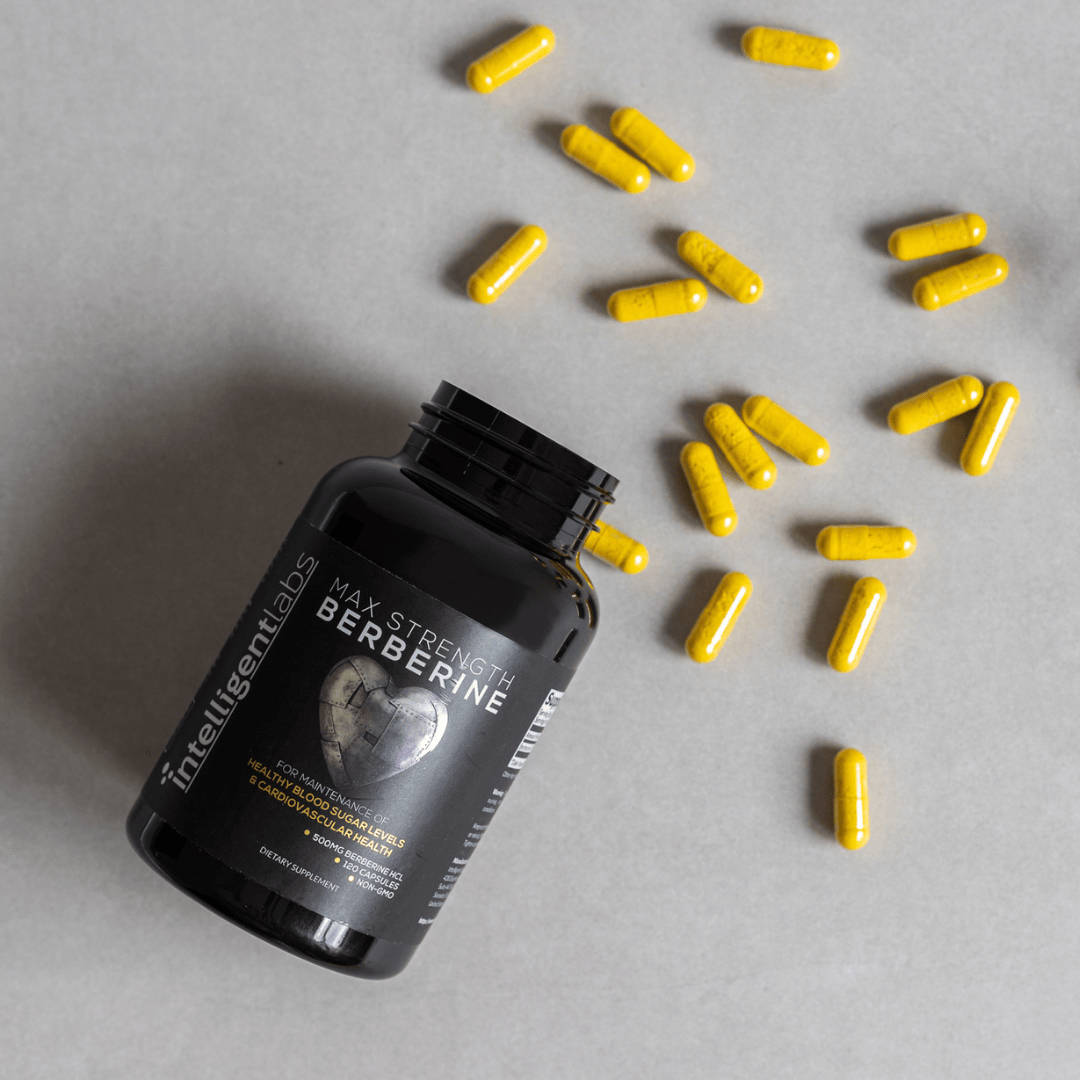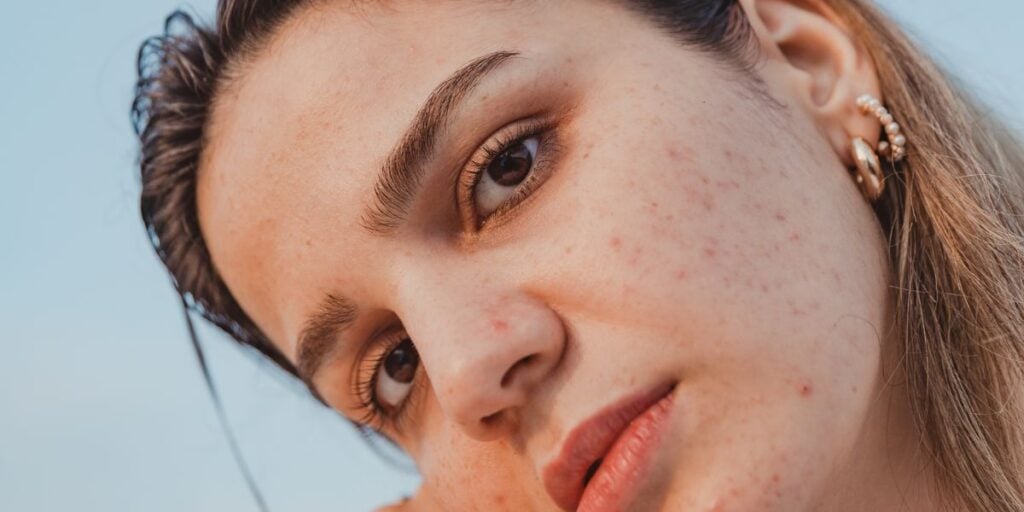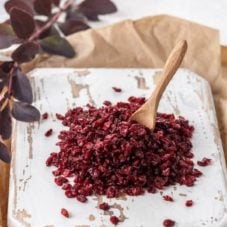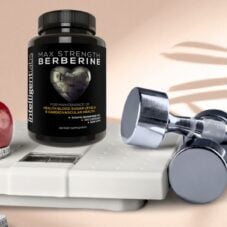PCOS, or Polycystic Ovarian Syndrome, is a head-scratching disorder. No one knows for sure how it starts. There’s no cure yet, but studies show that taking Berberine may help. It’s common enough that it’s said to affect 1 in every 10 women! In this blog post, we’ll focus on how PCOS affects skin health. We’ll also share actionable tips to help manage symptoms and support your skin from the inside out.
Table of Contents
How does PCOS affect women’s skin health?
It’s hard enough being a woman. But add in PCOS and skin issues, and being female just became a lot harder! Unfortunately, poor skin health due to PCOS can affect women’s self-esteem and self-confidence. Here’s how it can show up on your skin:
1) Really bad acne
Acne is a very common skin condition, often making its first appearance in teenagers and young adults. This coincides with when androgen levels are at their peak.
Clogged pores full of dead skin cells, bacteria, and excess sebum (due to excess androgen) can cause acne breakouts.1 If you’ve ever experienced a breakout, you know how painful it can be when touched! These breakouts noticeably worsen when menstrual periods occur. Even worse, the acne lesions are bigger, deeper, and take much longer to heal than regular acne.
PCOS acne also follows a certain pattern. For example, clusters of angry-looking, pus-filled pimples may form in the jawline, chin, and upper neck.
2) Excessively oily skin
Our sebaceous glands produce sebum to help protect and moisturize the skin. But excessive androgen hormones can cause sebaceous glands to produce too much sebum, leading to oily skin and acne.
3) Excessive hair growth (hirsutism)
Here’s another symptom brought about by excessive androgen levels in the body. Women usually don’t have mustaches, beards, or overly hairy bodies. But many PCOS women live with this unwanted hair growth. These aren’t fine hairs, unfortunately. Hair growth from hirsutism is thicker and darker. Moreover, there may even be hair growth on the chest, back, and buttocks in PCOS women.
4) Hair thinning (androgenic alopecia)
Male pattern baldness can occur in PCOS women, too. It’s understandably very upsetting to lose hair on the head but then see them grow in unwanted areas! Unfortunately, up to 40-70% of PCOS women experience this condition.2
5) Acanthosis nigricans
Acanthosis nigricans presents as dark skin patches in body folds and creases. Examples include the armpits, back of the neck, navel, the area below the breast, the groin, elbows, and knees. The affected skin also develops a thick, velvety texture. Some women say affected areas are itchy and have an odor.
Women with acanthosis nigricans tend to be overweight or obese and are at high risk of getting diagnosed with type 2 diabetes.3
6) Skin tags
These small bumps may not be a common PCOS symptom. But skin tags can grow on areas where acanthosis nigricans appear. So, they’ll most likely be visible in the armpit, neck, and groin.
How to manage PCOS and improve skin health?
The recommended way to treat skin issues is by visiting a dermatologist. They can prescribe various medications to treat specific symptoms.
We believe a holistic approach is the best way to manage PCOS symptoms and improve skin health. Here are our recommendations:
1) Eat a PCOS-friendly and anti-inflammatory diet
Low-grade chronic inflammation is said to be one of the root causes of PCOS. Avoiding foods that can trigger inflammation may therefore be one of the best ways to treat PCOS naturally.4
For instance, obese and overweight PCOS women who went on a 12-week anti-inflammatory diet reported amazing results! Many women lost excess weight and body fat and regained their periods. Also, all hormonal, metabolic, and inflammation markers went down, which proves this type of diet works.5
We wrote an in-depth blog post about the PCOS diet here, where we list down the food groups to eat and avoid if you have PCOS.
2) Berberine may help

Our Berberine supplement may be the right choice if you want a more natural approach.
Berberine is a compound found in many different plants, including barberry, tree turmeric, goldenseal, and Oregon grape. It is hypoglycemic, meaning it can lower blood glucose levels. This helps improve insulin sensitivity and reduces inflammation.
To know more about taking Berberine for PCOS, check out this article: Berberine For PCOS: Is It A Viable Treatment Option?
3) Take an Inositol supplement
Inositol is a water-soluble sugar alcohol found naturally in the human body. Our kidneys make about 2 grams per day. It’s also found in many foods, including meat, veggies, citrus fruits, grains, nuts, and seeds.
For PCOS, benefits may include better egg quality, improved menstrual cycles, lower testosterone and triglycerides, and reduced risk of gestational diabetes.
We’ve linked all the studies that support the above health benefits of inositol in this article: Inositol for PCOS: A Supplement That Really Works?
So, what are the hallmark symptoms of PCOS?
If you’re wondering whether your skin issues could be linked to PCOS, it helps to look at the bigger picture. Doctors diagnose PCOS when at least two of the following are present.6
1) High androgen levels
Androgen hormones are male sex hormones that give boys and men their male characteristics. The female ovaries also produce androgen, but in lower quantities than males.
Excess androgen contributes to many of the skin issues associated with PCOS. It can also lend to the male characteristics typically associated with PCOS women, e.g. hirsutism and male pattern baldness. A blood test can help detect androgen levels.
2) Irregular periods
This is the most common symptom of PCOS. Women who menstruate less than 9 times a year and have abnormally heavy periods may have PCOS. Irregular periods can disrupt the normal ovulation process, which affects fertility.
3) Polycystic ovary
The word ‘polycystic’ may be in the name of PCOS itself. But interestingly enough, not all PCOS women have cysts in their ovaries! For women that do have them, there will need to be at least 12 cysts present for a PCOS diagnosis to be made. These cysts may also be larger than normal.7
Conclusion
PCOS may not be life-threatening. But its effects on skin health can lead to low self-esteem, lack of self-confidence, anxiety, and even depression. Eating a healthy, PCOS-friendly diet and taking high-quality PCOS supplements are good starting points to help clear up many of the skin issues attributed to PCOS.
💬 Something on your mind? Share your thoughts in the comments. We love hearing from curious minds.
📩 And while you’re here, join our newsletter for more smart stuff (and secret perks)!
References:
- Cleveland Clinic. “Acne: Causes & Treatment.” Cleveland Clinic, Cleveland Clinic, 1 Sept. 2020, my.clevelandclinic.org/health/diseases/12233-acne. ↩︎
- “A Patient’s Guide: Management of Hair Loss in Polycystic Ovary Syndrome.” Contemporary OB/GYN, www.contemporaryobgyn.net/view/patients-guide-management-hair-loss-polycystic-ovary-syndrome. ↩︎
- Gambineri, A., et al. “Polycystic Ovary Syndrome Is a Risk Factor for Type 2 Diabetes: Results from a Long-Term Prospective Study.” Diabetes, vol. 61, no. 9, 14 June 2012, pp. 2369–2374, https://doi.org/10.2337/db11-1360. ↩︎
- Duleba, Antoni J., and Anuja Dokras. “Is PCOS an Inflammatory Process?” Fertility and Sterility, vol. 97, no. 1, Jan. 2012, pp. 7–12, https://doi.org/10.1016/j.fertnstert.2011.11.023. ↩︎
- Salama, AmanyAlsayed, et al. “Anti-Inflammatory Dietary Combo in Overweight and Obese Women with Polycystic Ovary Syndrome.” North American Journal of Medical Sciences, vol. 7, no. 7, 2015, p. 310, https://doi.org/10.4103/1947-2714.161246. ↩︎
- Mayo Clinic. “Polycystic Ovary Syndrome (PCOS) – Symptoms and Causes.” Mayo Clinic, 8 Sept. 2022, www.mayoclinic.org/diseases-conditions/pcos/symptoms-causes/syc-20353439. ↩︎
- “Polycystic Ovary Syndrome Q&a with Dr. Jessica Chan.” Cedars-Sinai, www.cedars-sinai.org/blog/polycystic-ovary-syndrome.html. ↩︎




